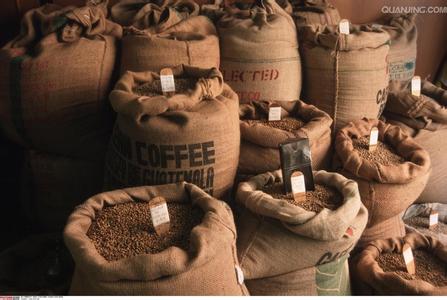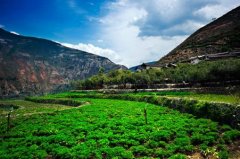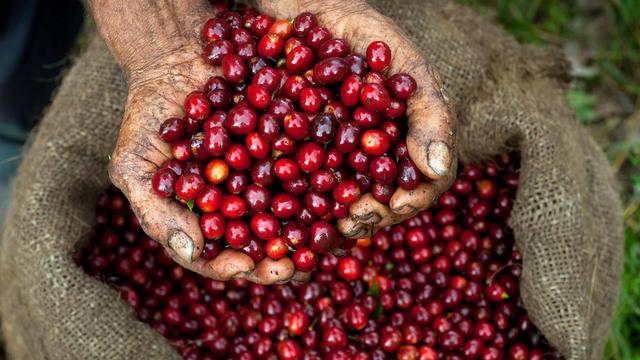Yunnan coffee production accounts for 99% of the country's lack of processing standards.

A cup of coffee costing tens of yuan is common in metropolises. However, in Yunnan Province, the main coffee producing area in China, the purchase price of coffee beans is about 15 yuan per kilogram. According to the figures released by the Yunnan Coffee Association, during the 2015-2016 harvest season, the average price of a kilogram of coffee beans purchased by enterprises from curry farmers is between 13 yuan and 14 yuan, and the market trade price is maintained at around 16 yuan.
Yunnan accounts for 99% of the country's coffee production, but farmers can't get a cup of coffee with a kilogram of coffee beans. Yunnan coffee is the second largest foreign exchange-earning agricultural product in the province, but there are not many high-yield and high-quality planting bases and a considerable amount of infrastructure is weak, which is restricted by this, so it is in the situation of low yield and low efficiency. The processing and marketing process is even more "short board", so that the influence of the brand needs to be improved.
The world status of Chinese coffee depends on Yunnan.
Chen Zhenjia, a doctor from the China Coffee Engineering Research Center, said that by the beginning of 2016, China had planted more than 1.8 million mu of coffee, with a total output of 140000 tons, accounting for 1.5 per cent of the world's total output. China is one of the 21 countries and regions that produce coffee in more than 70 countries and regions with an output of more than 100000 tons.
In China, coffee cultivation is concentrated in Yunnan, Hainan, Guangdong, Guangxi and other places. In the 1960s, coffee cultivation in China was mainly in Hainan. At that time, the planting area of coffee in Hainan was more than 200,000 mu. Today, more than 50 years later, coffee cultivation in China is mainly in Yunnan, while the planting area in Hainan has dropped to less than 10,000 mu.
"Yunnan has geographical and climatic conditions suitable for coffee growth, mainly in the four major producing areas of Dehong, Baoshan, Pu'er and Lincang, with a total planting area of 1.77 million mu and a total output of 139000 tons, accounting for more than 99 percent of the country's total." Chen Zhenjia said.
At present, nearly 60% of Yunnan coffee production comes from Pu'er. By the end of 2015, the planting area of coffee in Pu'er City has reached 755700 mu, with an output of 57900 tons, and coffee has been exported to more than 30 countries and regions, including America, Europe and Asia.
As a microcosm of the development of China's coffee industry, the development degree of "Yunka" determines the status of Chinese coffee in the world, but for a long time, Yunnan has mainly sold coffee beans, which is insufficient with downstream processing, and the profit space is not large. in addition, the coffee planting area is developing too fast, and the quality is difficult to control, which gradually becomes a hidden worry for development.
Lack of processing standards for planting "relying on nature for a living"
The unfavorable factors existing in every chain of the coffee industry make Yunnan coffee in a low-end state for a long time.
The dilemma faced by Yunka should start in the coffee garden. "at present, the coffee beans in Yunnan are of good quality only when they are on the trees, but they are not necessarily picked." Yang Zhiqi, chairman of Lincang Lingfeng Industry (Group) Co., Ltd., is very saddened by the extensive cultivation of coffee in Yunnan. "Farmers harvest coffee in a unified way along the coffee forest, mixing coffee fruits of different quality into a pile, and there are no primary processing facilities. We can only rely on natural drying and ferment as soon as it rains. Basically rely on heaven to eat, so that the loss of quality is extremely serious. "
The extensive planting mode reflects the lack and confusion of industry standards. Farmers create a set of standards for planting, enterprises plant a set of standards, and processing and production is another set of standards. In the view of many professionals, such chaos has led to the general instability of coffee quality in Yunnan, and it is difficult for many coffee enterprises to produce coffee beans of the same quality for two years in a row, which is also the fundamental reason why the price of coffee in Yunnan has always been slightly lower than the international price.
"first, the picking quality of fresh fruits is poor, and there are too many immature fruits; second, there is a lack of technical equipment for separating green fruits, and the quality of fresh fruits is mixed; third, there is a lack of mechanical degumming technology and equipment, resulting in uneven quality; and fourth, there is a lack of mechanical drying technology and equipment." Hu Lu, deputy secretary-general of Yunnan Coffee Industry Association, told the Workers' Daily.
The deficiency of intensive processing makes Yunnan coffee mainly for export of raw materials. The reporter learned that some foreign enterprises even pointed out that as long as the raw materials in Yunnan, even if the local enterprises have a certain degree of intensive processing capacity, they do not get too much trust from each other.
The low purchase price of raw materials has also dealt a blow to the enthusiasm of growers. When the purchase price is too low, the farmer will choose to abandon the tube, or cut down the coffee tree and grow other crops.
It takes deep processing to make up the short board.
Industry insiders told reporters that if you want to compete for the international voice of the coffee market, you must take the road of deep processing in order to affect the international coffee futures purchase price. The local coffee industry practitioners in Yunnan have been seeking a breakthrough in this area, and they need one or two leading enterprises to come forward and take the lead.
Dehong Hougu Coffee, as one of the leaders of Yunnan coffee industry, has the largest instant powder production line in the country. in response to the impact of falling international coffee prices, Dehong Hougu Coffee can digest Yunnan local coffee beans to a certain extent and buy farmers' coffee at a protective price. will not affect the enthusiasm and interests of farmers. "at present, each coffee trading center has its own reasons for existence, and the promotion and regulation of the market is the most in line with the law of the market." Xiong Xiangren, chairman of Yunnan Hougu Coffee Co., Ltd., said.
Lingfeng Coffee, which has become the largest coffee growing enterprise in China, has returned the land to farmers for planting, management and protection. All kinds of expenses and agricultural materials and fertilizers needed in the previous four years are all invested by the company, and each village is equipped with at least one technician to ensure that the coffee quality at every elevation and land is consistent and traceable. At the same time, there is also a dense layout of coffee processing plants to solve the problems of relying on heaven for food, unstable product quality and so on. Yang Zhiqi, chairman of the company, said that they have introduced Colombian coffee processing technology and equipment to ensure the quality of coffee production. This year, Lingfeng Coffee completed 9 processing sites and started the construction of 3 primary processing plants.
Yang Zhiqi told reporters that at present, Lingfeng has achieved product and origin docking traceability, the establishment of traceability from the seed to the cup, from the field to the table traceability system. Let the consumer consume clearly and know what kind of coffee he consumes and what kind of land he is growing in. "in fact, many curry enterprises lack financing channels and need a lot of money to invest in communication and channels."
At present, in Lincang, Pu'er, Dehong and other coffee growing areas in Yunnan, many enterprises with preliminary and deep processing capabilities have emerged. "I hope that the government will formulate a more unified and sustainable industrial policy, while supporting enterprises and managing the market." put more energy into the building of Yunnan coffee regional brand. " A person in charge of a Yunnan coffee company told reporters that most people are still full of confidence in the future. (yellow elm)
Important Notice :
前街咖啡 FrontStreet Coffee has moved to new addredd:
FrontStreet Coffee Address: 315,Donghua East Road,GuangZhou
Tel:020 38364473
- Prev

Cultivation techniques of Baoshan small-grain Coffee
I. the environmental conditions required by small-grain coffee originated in Ethiopia in north-central Africa, located in 69 N, 3440 E, 13001900m above sea level, with 16001900mm precipitation and an average annual temperature of 20 ℃. In the process of long-term evolution, coffee has specific requirements for environmental conditions due to the joint action of biology and climate.
- Next

[coffee Encyclopedia] teaches you to tell the good from the bad of coffee beans
Most people do not have much contact with coffee, and it is very rare to be able to identify the type of coffee from coffee beans. Even if you are lucky enough to know coffee, you may not go through everything from beans to liquids. Coffee is good and bad, so how can we identify it? 1. Coffee beans grow in microclimate coffee has many shapes and sizes, although most of them are the same shape, but it is best to correspond.
Related
- Beginners will see the "Coffee pull flower" guide!
- What is the difference between ice blog purified milk and ordinary milk coffee?
- Why is the Philippines the largest producer of crops in Liberia?
- For coffee extraction, should the fine powder be retained?
- How does extracted espresso fill pressed powder? How much strength does it take to press the powder?
- How to make jasmine cold extract coffee? Is the jasmine + latte good?
- Will this little toy really make the coffee taste better? How does Lily Drip affect coffee extraction?
- Will the action of slapping the filter cup also affect coffee extraction?
- What's the difference between powder-to-water ratio and powder-to-liquid ratio?
- What is the Ethiopian local species? What does it have to do with Heirloom native species?

